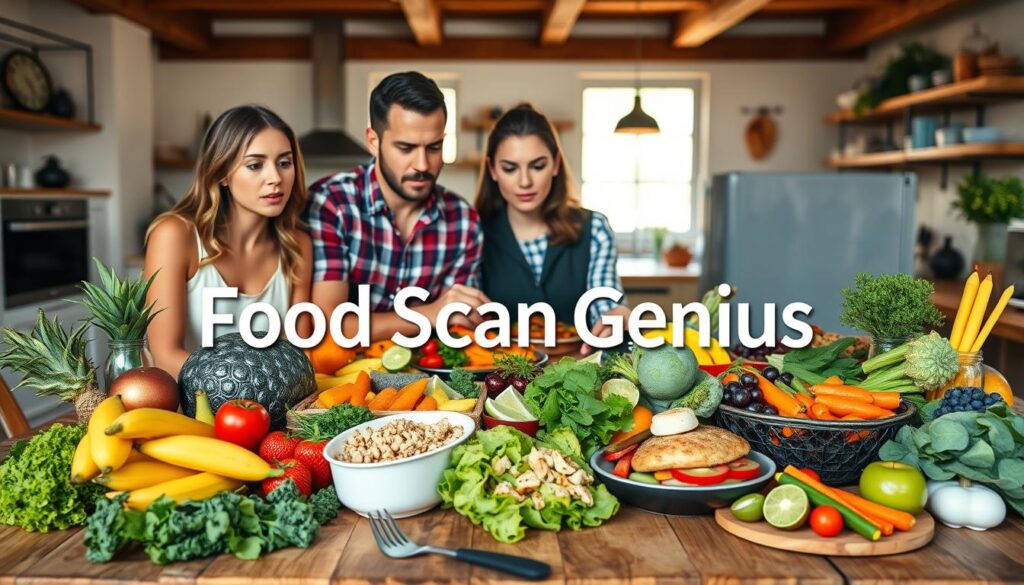Walking through my local grocery store, I saw a lot of vegan options. There were cruelty-free meat alternatives and guilt-free desserts. The plant-based revolution is here1. About 20% of people want to eat more vegan or plant-based food2.
I had thought about going vegan for a long time. I wanted better health, a clean conscience, and a sustainable future. So, I decided to start my vegan journey. It was tough at first, but with help and determination, I got used to it1.
This guide will cover everything about veganism. We’ll talk about its health benefits and how to switch easily. Whether you’re already vegan or just starting, this article will help you live a more conscious and fulfilling life.
Key Takeaways
- Veganism has been around since 1944 and is growing fast. 20% of people want to eat more plant-based foods12.
- A vegan diet can lower your risk of early death by 18-25%. It can also reduce cognitive health risks by up to 33%2.
- There are thousands of vegan recipes worldwide. You can even find vegan versions of junk food1.
- The Food Scan Genius app helps with vegan food choices and preferences.
- With belief and commitment, vegan living becomes easy. The Vegan Society offers over 100 discounts for just £2 a month1.
Understanding Veganism: What It Is and Why It Matters
Veganism is more than just a diet; it’s a lifestyle choice. It aims to exclude all animal exploitation for food, clothing, or entertainment3. This choice is based on the belief that animals are not just things for us to use. They are living beings that deserve our respect and kindness3.
Defining Veganism: More Than Just a Diet
Veganism is not just about avoiding meat, dairy, and eggs3. It’s about avoiding animal products in all parts of life. This includes clothes, personal care items, and supporting industries that harm animals, like zoos and circuses3. The Vegan Society, started in 1944 in England, says veganism is about avoiding animal exploitation for food, products, or entertainment3.
The Ethical Case for Veganism
Veganism is deeply concerned with animal welfare and reducing their suffering3. Vegans believe animals, like us, can feel pain and should not be treated as objects3. Science shows animals are intelligent, self-aware, and can form deep bonds3.
Environmental Benefits of Going Vegan
Animal agriculture has a big impact on the environment4. It’s responsible for 11 to 20 percent of all greenhouse gas emissions worldwide4. This is almost twice as much as plant-based foods4. The livestock industry also causes 37 percent of methane emissions from human activities4.
The beef industry is the main cause of deforestation, especially in the Amazon rainforest4. Going vegan can greatly reduce your environmental impact and help the planet5.
Studies show vegan diets are the best way to reduce your environmental impact5. A vegan lifestyle can improve your health, lower your carbon footprint, and be more compassionate4.
“Veganism could save 8 million human lives by 2050 and reduce greenhouse gas emissions from agriculture by two-thirds.”5
Health Benefits of a Vegan Diet
Choosing a plant-based diet can greatly improve your health. These diets are packed with fiber, antioxidants, and nutrients found in plants. They often have more potassium, magnesium, folate, and vitamins A, C, and E than traditional diets6. But, it’s important to make sure you get all the necessary vitamins and minerals, like vitamin B12 and calcium, to avoid deficiencies6.
Improved Heart Health
Eating a plant-based diet can be good for your heart. Vegans tend to be thinner and have lower BMIs than non-vegans6. Vegan diets are also better for losing weight than other diets6. They can also help lower blood sugar and improve kidney function in people with type 2 diabetes6.
Nutrient Density and Weight Management
Vegan diets are full of important nutrients and can help with weight management. Vegetarians eat more magnesium, potassium, iron, and other vitamins than meat-eaters7. A vegan diet can also lead to weight loss, with vegetarians losing about 1 pound a week7.
Reducing the Risk of Chronic Diseases
Switching to a plant-based diet can also lower the risk of chronic diseases. Vegans may have a 15% lower risk of cancer, especially colorectal cancer6. Eating more plant-based foods can also lower blood pressure by up to 75%6. Vegan diets can also reduce heart disease risk by up to 46%6. They may even help with pain in people with diabetes6.
By choosing a whole-foods, plant-based diet, you can gain many health benefits. It can help improve heart health, manage weight, and lower the risk of chronic diseases. A well-planned vegan diet is a great way to reach your wellness goals.
Key Nutrients to Consider on a Vegan Diet
Starting a vegan lifestyle means paying attention to getting all the nutrients your body needs. A well-planned vegan diet can be very nourishing. But, there are a few important vitamins and minerals that need extra care to keep you healthy.
Essential Vitamins and Minerals
Non-vegans often get calcium from dairy. But, vegans can get it from green leafy veggies, fortified drinks, tofu, sesame seeds, and pulses8. Vitamin D is key for bones and can be found in sunlight, fortified spreads, cereals, soy drinks, and supplements in autumn and winter8. Iron, needed for blood, is in pulses, wholemeal products, fortified cereals, dark greens, nuts, and dried fruits8. Vitamin B12, important for blood and nerves, is in fortified cereals, soy drinks, yeast extracts, and nutritional yeast flakes8.
Protein Sources for Vegans
Vegans can get high-quality protein from many plant-based foods. Legumes, tofu, tempeh, and quinoa are great sources8. It’s key to eat a variety of these to get all the amino acids your body needs.
Understanding Omega-3 Fatty Acids
Omega-3 fatty acids are good for the heart and may lower heart disease risk. You can find them in ground linseed oil, vegetable oil, chia seeds, hemp seeds, and walnuts8. While vegans might have less of certain omega-3s than meat-eaters9, it’s important to eat enough of these healthy fats for your health.
Drinking enough water is also crucial, with 6 to 8 cups daily recommended8. Pregnant or breastfeeding vegans need to make sure they get enough vitamins and minerals for their babies’ health8.
By knowing which nutrients to focus on and eating a variety of plant-based foods, you can do well on a vegan diet. You’ll enjoy all the benefits it offers.
A well-planned vegan diet can provide all the necessary nutrients for optimal health and well-being.
Getting Started: Making the Transition to Veganism
Starting a vegan lifestyle might seem hard at first. But, remember, small steps can lead to big changes. If you’re ready to start, we have some tips to make it easier.
Tips for Slowly Shifting to a Plant-Based Diet
Begin by replacing one animal product with a plant-based one. Try using almond or soy milk instead of cow’s milk10. Slowly cut down on meat, dairy, and eggs. Explore the tasty vegan foods out there10. Changing your lifestyle might seem scary, but it’s easier than you think10.
How to Stock Your Vegan Pantry
Stocking your pantry with vegan basics is key. Fill it with beans, lentils, quinoa, brown rice, nuts, seeds, and lots of fruits and veggies11. This makes it easy to cook healthy, plant-based meals11.
Meal Planning Basics
Planning your meals is crucial for a balanced vegan diet. Spend time each week planning, preparing, and cooking in bulk11. The Food Scan Genius app can help find vegan products and meals12. Soon, you’ll be making tasty, satisfying vegan dishes.
Remember, going vegan is a personal journey. Be patient and celebrate your small wins. Don’t hesitate to ask for help from your vegan friends10. With effort and a willingness to try new things, you’ll enjoy a healthier, kinder lifestyle.

“Transitioning to a plant-based diet is becoming increasingly popular worldwide, with vegan, vegetarian, pescatarian, Mediterranean, and DASH diets gaining significant traction.”11
Delicious Vegan Recipes for Every Occasion
Living a vegan lifestyle doesn’t mean you have to miss out on taste or creativity. There are many tasty and healthy vegan dishes to try, from breakfast to dinner. Whether you’re already a vegan chef or just starting, there’s something for everyone.
Breakfast Ideas to Kickstart Your Day
Begin your day with a healthy vegan breakfast. Make a creamy oatmeal bowl with fresh fruit and nuts13. Or, try a fluffy tofu scramble with veggies and whole-grain toast13. Smoothie bowls are great too, blending berries, greens, and plant-based milk for a tasty start13.
Quick and Easy Lunch Options
Vegan lunches can be easy and delicious. Make a wrap with your favorite plant-based protein, greens, veggies, and dressing14. Or, create a hearty salad with quinoa, roasted veggies, and tahini dressing14. For a cozy lunch, try vegan chili or lentil soup14.
Flavorful Dinner Dishes to Impress
Vegan dinners offer endless choices. Try plant-based Indian curries, Mexican enchiladas, or Mediterranean pasta1314. Roast veggies like sweet potatoes and Brussels sprouts, then serve over quinoa or rice13. For a comforting dish, make vegan mac and cheese or lentil shepherd’s pie13.
Vegan recipes open up a world of flavors and health. With a bit of creativity, you can find many tasty and healthy vegan meals. So, start your vegan journey and enjoy these amazing recipes1314.
Eating vegan is not about giving up the foods you love, but rather exploring a whole new world of delicious and nourishing plant-based options.
Debunking Common Vegan Myths
Many think veganism is hard or limiting. But, a well-thought-out vegan diet can give you all the nutrients you need. This includes protein, calcium, iron, and omega-3 fatty acids1516.
Addressing Nutritional Concerns
Some believe vegans can’t get enough protein. But, there are many plant-based sources like legumes, grains, nuts, seeds, and soy products. These can easily meet your protein needs16. Also, vegans don’t lack iron or calcium. Foods like dark leafy greens, tahini, and fortified plant-based milks are rich in these minerals15.
Misconceptions About Vegan Costs
Many think vegan food is pricey. But, staples like rice, beans, lentils, and fresh produce are often affordable. Buying them in-season or in bulk can save money16. While some vegan items might cost more, a well-planned vegan diet can be budget-friendly15.
Veganism and Food Variety
Some believe vegan diets are boring. But, vegan cuisine is incredibly diverse. You can find plant-based alternatives for dairy and meat16. The Food Scan Genius app helps by offering nutritional info and product suggestions. This makes it easier to keep your vegan diet varied and balanced.
By clearing up these myths, we can encourage more people to try veganism. It offers health, environmental, and ethical benefits. With the right info and tools, switching to a plant-based diet is easy and rewarding.

“A well-planned vegan diet is considered safe and nutritionally adequate by the British Dietetic Association, supporting healthy living in people of all ages.”15
Eating Out as a Vegan: Strategies and Tips
Dining out as a vegan is getting easier. More restaurants offer vegan options or can modify dishes for plant-based eaters. It’s key to research and clearly tell restaurant staff about your dietary needs for a great meal.
Finding Vegan-Friendly Restaurants
Before you go, look up restaurant menus or use apps like Food Scan Genius17 to find vegan spots. Many restaurants now highlight their vegan dishes, making it simpler to find good options17.
How to Modify Menu Items
Don’t be shy to ask for substitutions or to remove animal products from menu items. Restaurants usually are happy to make vegan changes if you ask nicely and clearly18.
Exploring Vegan Fast-Food Options
The fast-food world is also embracing veganism. Many big chains now have vegan burgers, sandwiches, and more. Check your favorite fast-food places for tasty vegan options on the go18.
With some research and clear communication, you can enjoy vegan meals almost anywhere. Supporting vegan-friendly places helps grow demand for plant-based food in the industry.
| Restaurant | Vegan Option | Price |
|---|---|---|
| The Green Lion | Vegan Burger (brown rice, quinoa, black beans) | $12.99 |
| Veggie Delight Café | Quinoa and Veggie Bowl | $9.95 |
| Cruelty-Free Diner | Tofu Scramble with Toast | $8.50 |
“100% of the plant-based dietitians interviewed emphasize the importance of bringing their own vegan dishes to social gatherings to ensure they have something delicious to eat.”17
By using these tips, you can easily find vegan food, whether at a restaurant or a fast-food place. A bit of planning and talking to staff can lead to a fulfilling vegan meal anywhere.
Vegan Brands and Products to Know
The demand for vegan and cruelty-free products is growing fast. The market is full of new brands that care about our planet and animals. We’ll explore the top vegan brands and products that are changing how we shop.
Popular Vegan Food Brands
Brands like Beyond Meat, Impossible Foods, Oatly, and Gardein are leading in vegan food. They offer tasty meat alternatives, dairy-free milk, and more19. For example, Good Foods Plant Based Queso Style Dip costs about $8 at Instacart19. Miyoko’s Creamery Organic Cashew Milk Mozzarella is around $919.
Eco-Friendly Vegan Alternatives
Many vegan consumers care about the environment, and brands are listening. Pela makes compostable phone cases20, and Allbirds offers sustainable shoes20. These companies are at the forefront of eco-friendly vegan products.
Vegan Beauty and Personal Care Products
The beauty and personal care world has also gone vegan. Brands like Pacifica, Hurraw!, and Axiology offer cruelty-free options20. They’re changing the game for ethical and sustainable self-care.
When looking for vegan products, check for “Certified Vegan” or “Leaping Bunny” labels. Many big brands now have vegan lines, making it easier to find what you need19. From affordable basics to luxury items, the vegan market keeps growing. It helps us make better choices for our planet and animals2021.
| Product | Price | Source |
|---|---|---|
| Good Foods Plant Based Queso Style Dip | $8 | Instacart |
| Miyoko’s Creamery Organic Cashew Milk Mozzarella | $9 | Instacart |
| Dr. Praeger’s California Veggie Burgers | $5 | Instacart |
| Native Forest Organic Jackfruit | $30 | Amazon |
| Forager Project Organic Dairy-Free Sour Cream | $4 | Instacart |
| Bob’s Red Mill Large Flake Nutritional Yeast | $7-$10 | Amazon, LuckyVitamin.com |
| Orgain Protein Pancake & Waffle Mix | $8 | Amazon |
| Hope Foods Organic Thai Coconut Curry Hummus | $4 | Amazon |
| JUST Egg Plant-Based Scramble | $5 | Instacart |
| Kite Hill Dairy Free Chive Cream Cheese | $8 | Instacart |
| ALDI Earth Grown Vegan Black Bean Chipotle Burger | n/a | ALDI |
| Daring Lemon & Herb Pieces | $1 | Instacart |
| Primal Kitchen No Dairy Alfredo Sauce | $8 | Thrive Market |
| Hippeas Organic Chickpea Snacks Vegan White Cheddar | $36 | Amazon |
| Blue Diamond Almond Breeze Unsweetened Chocolate Almondmilk | $2 | Instacart |
| GoNanas Banana Bread Mix Variety Pack | $24 | Nordstrom Rack |
| NEAT Egg Substitute Mix | $10 | Amazon |
| 88 Acres Dark Chocolate Sea Salt Seed Bar | $15 | Amazon |
| Daiya Mexican 4 Cheeze Style Blend | $7 | Instacart |
| ALOHA Plant Based Protein Bars | $26-$40 | Amazon, Walmart |
The vegan market is always growing, offering everything from affordable to luxury options. It helps us make better choices for our planet and animals2021.
Building a Supportive Vegan Community
Starting your vegan journey can be easier with a supportive community. Look for local vegan meetups, potlucks, or animal sanctuary events. These are great ways to meet others who care about a compassionate lifestyle22.
The internet has also grown its vegan communities. It offers support and connections for those new to veganism22.
Finding Local Groups and Events
Local vegan groups offer a sense of belonging and support. They host events like cooking classes and movie nights. These help you connect with others who get the vegan lifestyle23.
For example, UCLA’s Veg Bruins club has grown a lot. It hosts events like the Vegan Fair in Bruin Plaza23.
Online Resources and Forums
The internet is full of vegan communities online. You can find advice and inspiration on social media and forums. Sites like Facebook and Reddit’s r/vegan subreddit are great for discussions23.
These online spaces are perfect for those who can’t find local events. Or for those who like digital interactions22.
Engaging with Vegan Influencers and Blogs
Following vegan influencers and bloggers can keep you motivated. They share recipes, tips, and inspiring stories. Apps like Food Scan Genius also connect you with others who eat plant-based22.
Sharing your vegan journey can inspire others. So, don’t be shy about your experiences and support fellow vegans23.
FAQ
What is veganism and how does it differ from a plant-based diet?
Veganism is a lifestyle choice that excludes animal products for food, clothing, and more. It means avoiding meat, dairy, eggs, honey, and other animal products. A plant-based diet, on the other hand, focuses on eating plants but doesn’t exclude all animal products from life.
What are the ethical and environmental benefits of going vegan?
Veganism helps reduce animal suffering and promotes kindness. It’s also good for the planet, with lower greenhouse gas emissions. A vegan lifestyle can make you more eco-friendly and compassionate.
What are the health benefits of a vegan diet?
Vegan diets can lower your risk of heart disease, some cancers, and diabetes. They’re full of fiber, vitamins, and antioxidants, boosting health. They can also help with weight, gut health, and inflammation.
How can I ensure I get all the necessary nutrients on a vegan diet?
A well-planned vegan diet can give you all the nutrients you need. Focus on protein from legumes, tofu, and quinoa. Get calcium from fortified plant milks and greens. Vitamin B12 and D come from supplements or fortified foods. Iron is in lentils and fortified cereals. Omega-3s are in flaxseeds, chia seeds, and walnuts. Proper nutrition is key for health on a vegan diet.
How can I gradually transition to a vegan lifestyle?
Start by replacing one animal product at a time. Try plant-based alternatives like milk. Stock up on vegan foods and try new recipes. Use the Food Scan Genius app for vegan product ideas. Be patient and celebrate your vegan journey’s small wins.
What are some delicious vegan meal options?
Vegan meals are tasty and varied. For breakfast, try oatmeal with fruits and nuts, tofu scramble, or smoothie bowls. Lunch can be veggie wraps, salads, or Buddha bowls. Dinner options include lentil shepherd’s pie, stir-fries, or veggie burgers. Explore global cuisines for vegan inspiration.
How can I dispel common misconceptions about veganism?
Many myths surround veganism. A well-planned vegan diet can provide all nutrients, including protein and iron. Veganism doesn’t have to be expensive, thanks to affordable staples like beans and rice. The Food Scan Genius app can help debunk myths with accurate info and product suggestions.
How can I find vegan-friendly restaurants and dining options?
Eating out as a vegan is easier than ever. Many restaurants offer vegan options or can modify dishes. Research menus or use apps like Food Scan Genius to find vegan spots. Ask about substitutions when dining out to enjoy vegan meals.
What are some popular vegan brands and products to look for?
The vegan market is growing fast. Look for brands like Beyond Meat, Impossible Foods, Oatly, and Gardein. For eco-friendly choices, check out Pela and Allbirds. Vegan beauty brands include Pacifica, Hurraw!, and Axiology. Many brands now offer vegan lines.
How can I build a supportive vegan community?
A supportive community is key for vegan success. Join local vegan groups, attend events, and use online forums. Follow vegan influencers and blogs for tips and recipes. Apps like Food Scan Genius help connect with others and find vegan products.
Source Links
- How to go vegan
- How to Go Vegan: A Beginner’s Guide to Eating Plant-Based
- Defining Vegan
- What Veganism Is, Why It Matters and How to Eat Plant-Based
- Understanding veganism
- Health Benefits of a Vegan Diet
- Nutritional Update for Physicians: Plant-Based Diets
- The vegan diet
- 7 Supplements You Need on a Vegan Diet
- Transitioning to a Vegan Lifestyle
- Transitioning to a plant-based diet – tips and tricks | Parkview Health
- How To: Transitioning To A Plant Based Vegan Diet
- 67 Tasty Vegan Recipes That Are Totally Crave-Worthy
- Holy Cow Vegan | Easy, tasty vegan recipes
- 30 Common Misconceptions About Veganism Debunked
- Separating Fact from Fiction – Debunking Common Myths About the Vegan Diet
- How to Eat Vegan Out – Sharon Palmer, The Plant Powered Dietitian
- Healthy Vegan Eating Out Tips for Delicious Vegan Meals Out
- The 33 Best Vegan Food Products of 2022, According to Nutrition Experts
- List of vegetarian and vegan companies
- The 30 Best Vegan Food Finds at Walmart: The Ultimate Guide
- Greener veganism that can support your local community
- New organization aims to create community for vegan students – Daily Bruin






10 Comments
[…] when exploring vegan supplements, always look for quality and ethical sourcing. Your body and the planet will appreciate […]
[…] broccoli, and spring greens significantly boost iron absorption? These vegetables should be regular additions to your vegan staples [14]. These greens offer abundant antioxidants like lutein and beta-carotene which support overall […]
[…] balanced vegan diet can provide all the nutrients your body needs to function […]
[…] are often mixed up, but they’re not the same. Cruelty-free means no animal testing, while vegan means no animal products. Many brands now have vegan options that work just as well as the old […]
[…] grocery shopping. It uses AI to give you nutrition facts quickly. It supports many diets, like vegan and […]
[…] is more than just food. It means avoiding all animal products and processes. A product is vegan if it meets certain […]
[…] let’s start this vegan adventure together! We’ll explore the amazing world of vegan lifestyles. The only limit is […]
[…] common to miss animal products when you go vegan. Cheese, milk, and meat can be hard to give up. But, there are tasty vegan alternatives that can […]
[…] something sweet? Explore the world of vegan-friendly snacks and plant-based treats. They’ll satisfy your sugar cravings without harming your vegetarian lifestyle18. […]
[…] the top AI assistant for those with food allergies and dietary needs. Whether you’re vegan, gluten-free, or follow a specific diet, our app tailors recipes and recommendations for […]